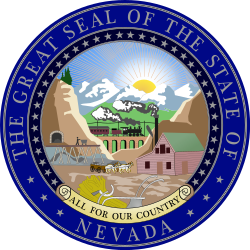| |||||||||||||||||
| |||||||||||||||||
 County results Bible: 50–60% 60–70% 70–80% Wright: 50–60% | |||||||||||||||||
| |||||||||||||||||
| Elections in Nevada |
|---|
 |
The 1962 United States Senate election in Nevada was held on November 6, 1962. Incumbent Democratic U.S. Senator Alan Bible was re-elected to a second term in office over Republican William B. Wright.

